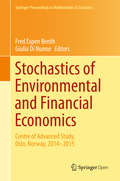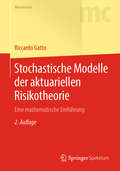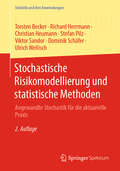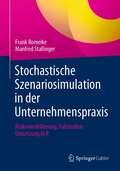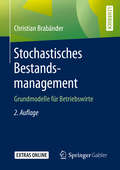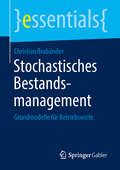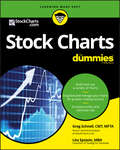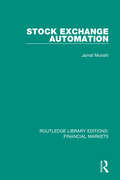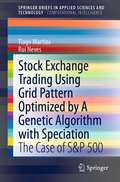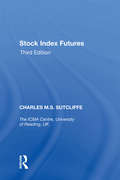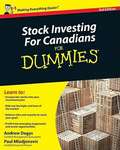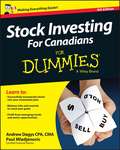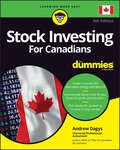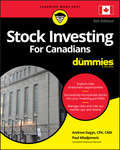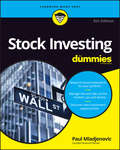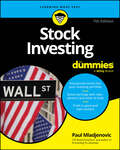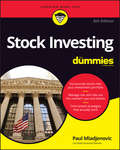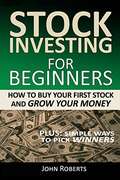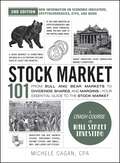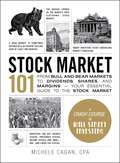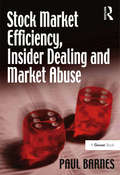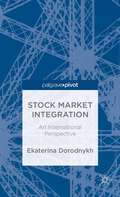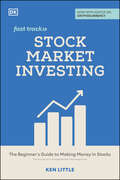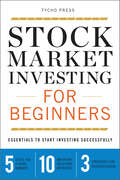- Table View
- List View
Stochastics of Environmental and Financial Economics
by Fred Espen Benth Giulia Di NunnoThese Proceedings offer a selection of peer-reviewed research and survey papers by some of the foremost international researchers in the fields of finance, energy, stochastics and risk, who present their latest findings on topical problems. The papers cover the areas of stochastic modeling in energy and financial markets; risk management with environmental factors from a stochastic control perspective; and valuation and hedging of derivatives in markets dominated by renewables, all of which further develop the theory of stochastic analysis and mathematical finance. The papers were presented at the first conference on "Stochastics of Environmental and Financial Economics (SEFE)", being part of the activity in the SEFE research group of the Centre of Advanced Study (CAS) at the Academy of Sciences in Oslo, Norway during the 2014/2015 academic year.
Stochastische Modelle der aktuariellen Risikotheorie: Eine mathematische Einführung (Masterclass)
by Riccardo GattoDieses Buch führt mathematisch präzise in die stochastischen Modelle ein, die bei der Bewertung von Schadensbeträgen für Versicherungen von besonderer Bedeutung sind. Abgedeckt werden Modelle für kleine und große Schadensbeträge, Modelle für extreme Ereignisse, Risikomaße, sowie die stochastischen Prozesse der aktuariellen Risikotheorie: Zählprozesse, zusammengesetzte Prozesse, Erneuerungsprozesse und Poisson-Prozesse. Zentrales Thema ist die Bestimmung der Ruinwahrscheinlichkeit des Versicherers. In diesem Zusammenhang werden analytische Lösungen, asymptotische Approximationen sowie numerische Algorithmen wie die Monte-Carlo-Simulation vorgestellt. Gute Grundkenntnisse in der Wahrscheinlichkeitstheorie werden vorausgesetzt, doch ein Anhang mit den wichtigsten Resultaten erleichtert die Lektüre dieses Buches. Das Buch ist geeignet für fortgeschrittene Bachelor- oder Masterstudierende der Mathematik oder Statistik mit entsprechender Vertiefungsrichtung. Darüber hinaus richtet es sich an Kandidaten, die das Diplom der Schweizerischen Aktuarvereinigung (SAV) erwerben oder sich auf das Diplom der Society of Actuaries (SOA) vorbereiten möchten. Auch praktizierende Versicherungsmathematiker, die ihre technischen Kenntnisse vertiefen wollen, werden angesprochen. Die vorliegende zweite Auflage enthält theoretische Ergänzungen, insbesondere Resultate über die Fluktuationen der Summe und der zusammengesetzten Summe, d.h. des Gesamtschadensbetrages einer Periode. Darüber hinaus erleichtern nun neue Aufgaben verschiedener Schwierigkeitsgrade und mit ausführlichen Lösungen das Selbststudium.
Stochastische Risikomodellierung und statistische Methoden: Angewandte Stochastik für die aktuarielle Praxis (Statistik und ihre Anwendungen)
by Richard Herrmann Torsten Becker Viktor Sandor Dominik Schäfer Ulrich Wellisch Christian Heumann Stefan PilzDieses Buch vereinigt Konzepte und Methoden der stochastischen Modellbildung, der statistischen Analyse und der aktuariellen Anwendung in einem Band. Dabei wird eine kompakte, aber dennoch für Theoretiker wie Praktiker verständliche und interessante Darstellung der Themen Risikobewertung, Datenanalyse, Parameterschätzung, verallgemeinerte lineare Regression, stochastische Prozesse und Differenzialrechnung, Zeitreihen, biometrische Modelle, Credibility sowie Simulation gegeben. Zahlreiche Beispiele illustrieren die Anwendung der Konzepte in der aktuariellen Praxis, wobei auf Modelle aus der Personen- und Sachversicherung und der Finanzmathematik eingegangen wird.
Stochastische Szenariosimulation in der Unternehmenspraxis: Risikomodellierung, Fallstudien, Umsetzung in R
by Frank Romeike Manfred StallingerDas Buch zeigt, wie Unternehmen durch die Anwendung der stochastischen Szenariosimulation ein wirksames und effizientes Risikomanagement umsetzen können. Die einfache Darstellung der Grundbegriffe und Methoden der Stochastik, ergänzt um Beispiele und Fallstudien aus der Praxis, geben dem Leser ein praxiserprobtes Toolkit an Instrumenten für die praktische Umsetzung mit auf den Weg.Die Autoren führen zunächst in die faszinierende Welt des Zufalls ein und erklären die Grundbegriffe der deskriptiven und auch für das Risikomanagement wichtigen Inferenzstatistik. Anschließend geben sie einen Einblick in erforderliche Wahrscheinlichkeitsverteilungen mit deren Risikomaße und Anwendung in der Praxis und beschreiben Verfahren der Risikoaggregation und der Effizienzbewertung von Risiko-Abmilderungsmaßnahmen. Diese Einführung wird begleitet durch konkrete Fallbeispiele, die in der Programmumgebung „R“ umgesetzt wurden.Ergänzend zur Einführung in die spannende Welt der Stochastik werden in einem separaten Kapitel typische Fallstudien aus der Praxis präsentiert. Die Beispiele werden als Sourcecode in der Programmiersprache „R“ für eine praktische Anwendung sowohl im Buch als auch in elektronischer Form von den Autoren zum Download bereitgestellt.
Stochastisches Bestandsmanagement: Grundmodelle für Betriebswirte
by Christian BrabänderDieses Buch erklärt grundlegend das betriebliche Gestaltungsfeld Bestandsmanagement und führt die relevanten Begriffe und Formeln ein. Es beschäftigt sich mit Antworten auf die Fragen, wann Produktbestellungen aufgegeben werden und wie viel auf einmal bestellt werden soll. Dabei werden die Unsicherheiten des zu versorgenden, konsumierenden Prozesses und des Nachschub-Prozesses berücksichtigt. Diese Aufgaben können mithilfe von Modellen optimal gelöst werden. Die wichtigsten Modelle zur Beantwortung der Fragen nach dem Wann und dem Wieviel werden einsteigerfreundlich erklärt und ihre Anwendung an einfachen Beispielen gezeigt. Nacheinander werden das klassische Bestellmengenmodel, das Newsvendor-Modell, das kontinuierliche und das periodische Bestandsmodell erläutert. Weiterführend werden die Anwendungsfälle Zentralisierung und Risikomanagement aus Sicht der Bestandsführung vertieft.
Stochastisches Bestandsmanagement: Grundmodelle für Betriebswirte (essentials)
by Christian BrabänderDieses essential erklärt grundlegend das betriebliche Gestaltungsfeld Bestandsmanagement und führt die relevanten Begriffe und Formeln ein. Stochastisches Bestandsmanagement beschäftigt sich mit Antworten auf die Fragen, wann Produktbestellungen aufgegeben werden sollen und wie viel auf einmal bestellt werden soll. Dabei werden die Unsicherheiten des zu versorgenden, konsumierenden Prozesses und des zuliefernden Nachschub-Prozesses berücksichtigt. Diese Aufgaben können mithilfe von Modellen optimal gelöst werden. Die wichtigsten Modelle zur Beantwortung der Fragen nach dem Wann und dem Wie viel werden einsteigerfreundlich erklärt und ihre Anwendung an einfachen Beispielen und einer Fallstudie gezeigt. Nacheinander werden das Newsvendor Modell, das kontinuierliche und das periodische Bestandsmodell erläutert.
Stock Charts For Dummies
by Lita Epstein Greg SchnellThe easy way to get started in stock charts Many trading and technical analysis books focus on how to use charts to make stock trading decisions, but what about how to actually build a chart? Stock Charts For Dummies reveals the important stories charts tell, and how different parameters can impact what you see on the screen. This book will explain some of the most powerful display settings that help traders understand the information in a chart to find outperformance as its beginning. Stock Charts for Dummies will teach you how to build a visually appealing chart and add tools based on the type of trading or investing decision you're trying to make. It will also introduce you to the pros, cons, and best practices of using three key types of charts: Candlesticks, Bar Charts, and Line Charts. Build and use technical chart patterns Increase profits and minimize risk Track and identify specific trends within charts A unique guide for beginning traders and investors, Stock Charts for Dummies will help you make sense of stock charts.
Stock Exchange Automation (Routledge Library Editions: Financial Markets #8)
by Jamal MunshiOriginally published in 1994, Stock Exchange Automation addresses the pivotal role played by capital markets in the market economics. Capital markets are an essential component of the free market system. The book argues that the capital markets function as an allocator of investable funds among competing uses. The movement toward automated markets requires that we understand how automation changes market behaviour. The book also examines the concept of market microstructure theory, and the implication that some forms of automation should affect prices. Theories of price formation in the specialist based trading system hypothesise that the trading mechanism induces short term price volatility.
Stock Exchange Trading Using Grid Pattern Optimized by A Genetic Algorithm with Speciation: The Case of S&P 500 (SpringerBriefs in Applied Sciences and Technology)
by Rui Neves Tiago MartinsThis book presents a genetic algorithm that optimizes a grid template pattern detector to find the best point to trade in the SP 500. The pattern detector is based on a template using a grid of weights with a fixed size. The template takes in consideration not only the closing price but also the open, high, and low values of the price during the period under testing in contrast to the traditional methods of analysing only the closing price. Each cell of the grid encompasses a score, and these are optimized by an evolutionary genetic algorithm that takes genetic diversity into consideration through a speciation routine, giving time for each individual of the population to be optimized within its own niche. With this method, the system is able to present better results and improves the results compared with other template approaches. The tests considered real data from the stock market and against state-of-the-art solutions, namely the ones using a grid of weights which does not have a fixed size and non-speciated approaches. During the testing period, the presented solution had a return of 21.3% compared to 10.9% of the existing approaches. The use of speciation was able to increase the returns of some results as genetic diversity was taken into consideration.
Stock Index Futures (Innovative Finance Textbooks Ser.)
by Charles M.S. SutcliffeThe global value of trading in index futures is about $20 trillion per year and rising and for many countries the value traded is similar to that traded on their stock markets. This book describes how index futures markets work and clearly summarises the substantial body of international empirical evidence relating to these markets. Using the concepts and tools of finance, the book also provides a comprehensive description of the economic forces that underlie trading in index futures. Stock Index Futures 3/e contains many teaching and learning aids including numerous examples, a glossary, essay questions, comprehensive references, and a detailed subject index. Written primarily for advanced undergraduate and postgraduate students, this text will also be useful to researchers and market participants who want to gain a better understanding of these markets.
Stock Investing & Trading for Canadians eBook Mega Bundle For Dummies
by Lita Epstein Andrew Dagys Paul Mladjenovic Michael GriffisGet these two great books in one convenient ebook bundle! Stock Investing For Canadians For Dummies, Third Edition includes information on stock investing in both bear and bull markets; unique investment segments; stock investing for different types of situations; and examples straight from the real world of stock investing as they have occurred in the past three years. With up-to-date references and resources, this book is the most reliable resource for the new stock market investor. New in this edition: Investigating how governments affect markets: The authors present an unbiased look at how government intervention can and has shaped the markets, so that investors know what to watch for and can respond appropriately to protect their investments—or even benefit Explaining economics: As governments around the world intervene in the markets, media coverage of the economic theory behind these moves (and the economic theories that deplore them) has expanded greatly—and most of it's muddled; new content in the book explains what investors need to know about economics Exploring stock trading: For readers that want to move stocks quickly rather than invest for the long run, the authors offer a crash course in the fundamentals of trading, and some critical do's and don'ts This edition also offers a brand-new part of tens focused on how investors can protect their money and spot warning signs when a good stock is about to go bad Trading For Canadians For Dummies stresses the practice of position trading, conducting technical analysis on a company and its performance, and research methods that enable the trader to strategically select both an entry and exit point before a stock is even purchased. Adapted for Canadian readers, this edition discusses the Toronto Stock Exchange, brokerage options in Canada, and how Canadians can become certified traders. With Canadian examples and resources, this is the only guide to trading tailor-made for Canadians.
Stock Investing For Canadians For Dummies
by Andrew Dagys Paul MladjenovicThe bestselling Canadian guide to building a profitable stock portfolio, revised and updatedWant to make money in stocks without losing your shirt? This practical guide gives you proven strategies for weathering any economic climate and for selecting and managing profitable investments in either a bear or bull market. You'll navigate the new economic landscape and choose the right stocks for different situations - and you'll find fresh real-world examples that show you how to maximize your returns. Get started with the basics - understand stock value, assess your finances, set your investing goals, and know your investing style Recognize the risks - explore different kinds of risk and weigh risk against return Make informed investing decisions - research stocks, understand growth and income investing, and use basic economics to improve your stock strategy Build a strong foundation for your portfolio - investigate industries, evaluate a company's financial health, and understand the effect of government on stock investing Capitalize on emerging sector opportunities - from precious metals to alternative energy, discover the hot sectors that will make your portfolio thrive Build (and hold on to) your wealth - get expert tips and tactics for buying with fewer costs and keeping the CRA at bayOpen the book and find: The differences between stock investing and trading How to understand and use indexes The various types of investment dealers and how to use one New ways to gather stock information online Methods for tracking insider trading Early signs of megatrends that can affect your portfolio Solutions for protecting your profits Canadian investing resources and financial ratiosLearn to: Incorporate stocks into your investment plan Ride out the highs and lows of the market Balance risks and rewards to reach your goals Profit from emerging megatrends and sector opportunities
Stock Investing For Canadians For Dummies
by Andrew Dagys Paul MladjenovicMaster the basics of stock investing? Easy. If you want to learn how to profitably invest in stocks, this is the book for you. This updated new edition of Stock Investing For Canadians For Dummies offers straight answers and simple advice for any Canadian who wants to take control of his or her portfolio. With practical guidance on making wise investments in any market--even today's uncertain one--this plain-English guide covers unique investment segments, how to invest in different market situations, and real and recent examples on what to invest in and when. With fully updated references and resources, this is the perfect stock investing guide for beginners. Updated to include the latest information on the current stock market, as well as fresh case studies Written by expert authors--one an accountant and the other a certified financial planner and investing consultant Ideal for novice investors and those planning for retirement
Stock Investing For Canadians For Dummies
by Andrew DagysThe updated guide to investing in any kind of market environment Stock Investing For Canadians For Dummies keeps you current as the Canadian stock market, industry, and tax laws go through a series of critical changes. Inside, you'll find expert tips and advice on how to navigate flat, thriving, or declining markets. Plus, this friendly, just-for-Canadians guide will help you minimize risk and maximize your investment returns. This latest edition also covers independent online brokers and robo-advisor services, so you can weigh all your options. With up-to-date references and resources, this book is the most reliable guide for the new stock market investor. Invest successfully in a challenging post-pandemic environment that includes international tension, high interest rates, and economic instability Take advantage of trends like the sharing economy, fintech, Web 3.0, decarbonization, cannabis, and more by investing in companies that lead the innovation charge Understand unique Canadian investment segments and situations Learn how to minimize your investing risks See how to invest during periods of inflation Get timely examples and unique perspectives straight from the real-world stock market Stock Investing For Dummies is perfect for readers new to investing in the stock market who are looking for a comprehensive guide to making sure their investments grow.
Stock Investing For Canadians For Dummies (Fifth Edition)
by Andrew Dagys Paul MladjenovicCanada is experiencing a large housing bubble, and if you’re a Baby Boomer looking to downsize, it’s more important than ever to find a way to invest your extra money, especially in a low interest environment. Plus, some very significant tax rules exist (e.g. registered savings plans for retirement and investing, income splitting, and estate planning) that affect investors, and few Canadian publications address these new realities in the stock investing context. Canadian stock investors also have unique opportunities to invest in a recovering domestic commodity sector and a strong dividend-rich and growing financial sector. <p><p> Stock Investing For Canadians For Dummies, 5th edition arms you with trusted information on stock investing in both bear and bull markets; unique investment segments like the legal medical marijuana sector; stock investing for different types of goals, styles, and stages of life; and examples straight from the real world of stock investing as they have occurred in the past few years. With up-to-date references and resources, this fundamentally powerful yet easy-to-read book is the most reliable Canadian resource on stock market investment you can get your hands on!
Stock Investing For Dummies
by Paul Mladjenovic<p>Updated with new and revised material to reflect the current market, this new edition of <i>Stock Investing For Dummies<i> gives you proven strategies for selecting and managing profitable investments. no matter what the conditions. You'll find out how to navigate the new economic landscape and choose the right stock for different situations—with real-world examples that show you how to maximize your portfolio. <p>The economic and global events affecting stock investors have been dramatic and present new challenges and opportunities for investors and money managers at every level. With the help of this guide, you'll quickly and easily navigate an ever-changing stock market with plain-English tips and information on ETFs, new rules, exchanges, and investment vehicles, as well as the latest information on the European debt crisis. <p> <li>Incorporate stocks into your investment portfolio <li>Understand and capitalize on current market conditions <li>Balance risk and reward <li>Explore new investment opportunities</li> <p> <p><i>Stock Investing For Dummies</i> is essential reading for anyone looking for trusted, comprehensive guidance to ensure their investments grow.</p>
Stock Investing For Dummies
by Paul MladjenovicGet started with stock investing and achieve your personal finance goals The bestselling Stock Investing For Dummies is full of practical and realistic stock market guidance. Today's market is full of surprises, and this book will help you understand all aspects of the investing process, so you can thrive as an investor, come what may. With straightforward direction from a renowned best-selling author and national financial authority , this book discusses the many different ways you can invest in stocks, so you can create a portfolio that works for you. You'll also find updates on the latest trends and growth opportunities, plus insights into what it means to invest wisely in the current financial environment. Be confident in your investment decisions, thanks to this sound Dummies advice. Build a strategic stock portfolio that meets your needs Discover the basics of investing, including how to invest in difficult markets Learn how to invest in AI and how to make the most of AI investing tools Explore ETFs, preferred stocks, options, factor investing, stock warrants , and beyond This is a great Dummies guide for new investors looking for a comprehensive guide on the current stock market, as well as those looking to brush up their stock investing skills.
Stock Investing For Dummies: 5th Edition (For Dummies Ser.)
by Paul MladjenovicMladjenovic has written all five previous editions of Stock Investing For Dummies. This experienced author combines years of experience to teach investors and consumers what they need to know on the cusp of big changes in the marketplace. New tax laws and changes in the marketplace offer challenges to the financial landscape that investors have grown accustomed to. Understand the new financial horizons and learn how to invest wisely.
Stock Investing for Beginners: How to Buy Your First Stock and Grow Your Money
by John RobertsA former janitor and gas station attendant in Vermont, who died a few years ago, surprised everyone by leaving an $8 million fortune to his local library and hospital. <P><P>What was his secret, everyone wondered? And the answer turned out to be pretty basic. Because, besides being industrious and frugal, which you may have guessed, he had invested in the stock market throughout the years. <P><P>This is actually not as surprising as it may sound. According to a recent World Wealth Report, the wealthy invest the largest part of their money into stocks and businesses. Our wise janitor had simply done what the wealthy do. So he got a similar result. That is, he grew his money into considerable wealth. <P><P>And you can do this too. Now, we aren't saying you will make $8 million. After all, this is a beginners book and the janitor had an extraordinary result. But stock market investing is one of the best tools you can use to build a more secure financial future for you and your family. <P><P>So are you someone who wants to make money in the stock market? And does that story make you feel excited? Have you tried to understand the stock market, only to be discouraged by how complicated it all seems? And aren't you just a little bit encouraged that an ordinary person, like our janitor from Vermont, could invest in stocks and succeed? <P><P>If you answered yes to any of those questions, then this book just might be the solution you've been looking for. Because it will show you just what you need to know, and no more, to start investing in the stock market. <P><P>And it will describe all of this for you in simple terms you already understand. Not complicated theory. Not a mind-numbing blitz of technical buzzwords. Just what you need to know and no more. And the few specific steps you can take to get started. <P><P>Here's what you will learn: -The 5 big reasons to invest in stocks -Simple explanations of the basics of stock market investing -Great sources of recommendations to help you pick winners (no complicated research required) -The one thing you must do to get started (but you only have to do it once) -How to buy and sell stocks -3 key strategies to protect your stock investments from big losses -And many more invaluable tips on building your stock portfolio <P><P>So that by the end of this book, you will be able to buy your first stock. You will know the simple steps to grow your money in the stock market. And start on the your path to a more secure financial future.
Stock Market 101, 2nd Edition: From Bull and Bear Markets to Dividends, Shares, and Margins—Your Essential Guide to the Stock Market (Adams 101 Series)
by Michele CaganDiscover the ins and outs of Wall Street with the 2nd edition to the engaging, informative, and easy-to-navigate guide to investing with all-new entries and updates throughout.Investing for the first time can be intimidating. In easy-to-understand language, Stock Market 101, 2nd Edition provides the groundwork needed to begin building knowledge on the stock market. It cuts out the boring explanations of basic investing, and instead provides hands-on lessons that keep you engaged as you learn how to build a portfolio and expand your wealth. Full of basic definitions and real-life examples, Stock Market 101, 2nd Edition alleviates any uneasy or overwhelmed feelings during your first steps toward your investment goals. From bull markets to bear markets to sideways markets, this primer is packed with hundreds of entertaining tidbits and concepts that you won&’t be able to get anywhere else. So whether you&’re looking to master the major principles of stock market investing or just want to learn more about how the market shifts over time, Stock Market 101, 2nd Edition has all the answers—even the ones you didn&’t know you were looking for.
Stock Market 101: From Bull and Bear Markets to Dividends, Shares, and Margins—Your Essential Guide to the Stock Market (Adams 101)
by Michele CaganAll you need to know about buying and selling stocks! Too often, textbooks turn the noteworthy details of investing into tedious discourse that would put even a hedge fund manager to sleep. Stock Market 101 cuts out the boring explanations of basic investing, and instead provides hands-on lessons that keep you engaged as you learn how to build a portfolio and expand your wealth. From bull markets to bear markets to sideways markets, this primer is packed with hundreds of entertaining tidbits and concepts that you won't be able to get anywhere else. So whether you're looking to master the major principles of stock market investing or just want to learn more about how the market shifts over time, Stock Market 101 has all the answers--even the ones you didn't know you were looking for.
Stock Market Efficiency, Insider Dealing and Market Abuse
by Paul BarnesThe recent turbulence in the stock market has brought into question the way, and prices at which, shares are traded, and how the market effectively values companies. It has also raised public concern as to the way by which dealers and investors take advantage of changes in market prices. A number of high profile criminal prosecutions of insider dealing and market abuse and the frequent claims of other instances, combined with the changes in regulations resulting in a more aggressive and proactive stance by the various regulators, have brought the issue under the spotlight. This book discusses what makes stock market efficiency so important for the economy, looks at the theory and issues that underpin market abuse and why an offence often dismissed as a victimless crime is punished so severely. It explores the impact of perception and other factors that distort the market and outlines the extent of abuse. Regulators, lawyers, company officials, investigators, professional advisers and of course investors, both professional and otherwise will find this a helpful guide to the underlying elements of fraud and market manipulation.
Stock Market Integration: An International Perspective
by Ekaterina DorodnykhThis book provides an original approach to the determinants of stock exchange integration. With case studies of successful integration projects in Europe, North America, Latin America as well as intercontinental cross-border mergers, it provides a complete analysis of all existing integration projects between stock exchange markets.
Stock Market Investing Fast Track: The Beginner's Guide to Making Money in Stocks
by Ken LittleMust-have advice for financial success to modern investingEasy, accessible, and to the point, Stock Market Investing Fast-Track gets you up to speed quickly on the essential strategies and techniques you need to make money in the modern stock market. In this new and improved guide, you'll find: Pointers on identifying, analyzing, and buying the right stocks at the right timeAdvice on minimizing your risks and maximizing your rewards on purchasesTips on when to buy, when to sell, and when to let it rideA look at common investing mistakes and how to avoid themGuidance on managing your portfolio for long-term successA rundown of best practices on investing in cryptocurrency
Stock Market Investing for Beginners: Essentials to Start Investing Successfully
by Tycho Press"This book provides a good foundation for the beginning investor who is setting out to venture in the stock market. It tells you in plain English about the fundamentals of stock market and investment strategies to deepen your investing literacy. If you're looking for good advice on which stock to buy and when to sell it, you can find it in this book."—Best Ways to Invest Money BlogInvesting in the stock market is a great way to build your wealth, but for those of us who aren't professional stockbrokers, knowing what information to trust and where to put your money can seem overwhelming. Stock Market Investing for Beginners provides you with the strategic advice and knowledge necessary to make informed investment decisions. Equipping you with everything you need to take control of your financial future, Stock Market Investing for Beginners removes the guesswork from investing.Stock Market Investing for Beginners gives you the tools to start investing wisely and successfully, with:A Comprehensive Overview covering the fundamentals of stock market investingStrategic Advice on buying, selling, owning, and diversifyingInvaluable Tips on building your financial portfolio through stock market investing"As a financial advisor, I recommend this book to anyone wanting to learn the Wall Street stock market game and build wealth."—Cheryl D. Broussard, reader and financial advisorLearn how to make the best of your investment with Stock Market Investing for Beginners.
